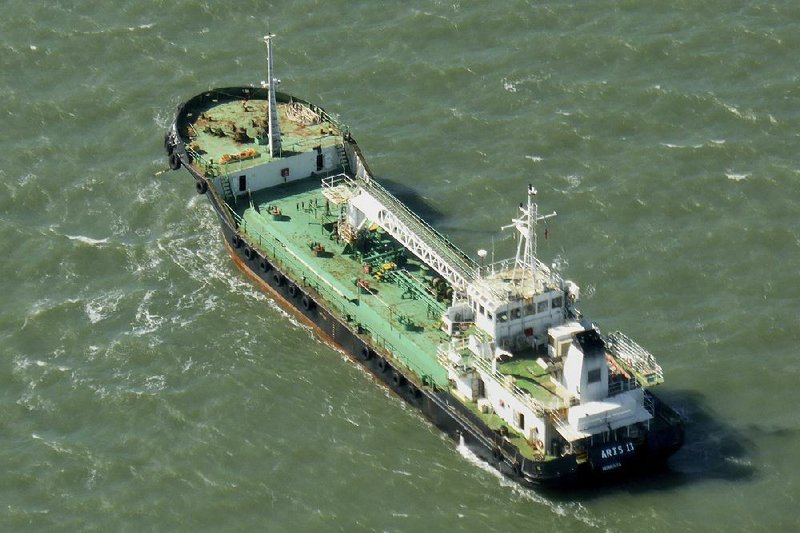MOGADISHU, Somalia -- Pirates off the coast of Somalia have seized an oil tanker with eight Sri Lankans on board, in what was believed to be the first hijacking of a large commercial vessel in the region since 2012, officials said Tuesday.
The merchant ship was intercepted while en route to Mogadishu, the Somali capital, from Djibouti, and was diverted toward Alula, a port in the semiautonomous Puntland region in northeastern Somalia, Ali Shire Mohamud Osman, the district commissioner in Alula, said in a telephone interview.
The ship's crew sent a distress signal Monday evening, saying the vessel was being approached by speedboats.
Abdikamil Moalin Shukri, a spokesman for the Ministry of Interior and Security, said the agency was awaiting more details.
The chairman of Puntland's anti-piracy operation, Abdirisak Mohamed Dirir, denied that any of Puntland's troops were involved in the seizure of the ship. He said it was hijacked by "Somali pirates."
The vessel, the Aris 13, was a small tanker delivering fuel, according to John Steed, a retired British army colonel who is now the Horn of Africa regional manager for Oceans Beyond Piracy, a program based in Colorado that works to combat piracy.
"The local authorities up there confirm pirates have a ship they are holding, and are holding the crew against their will," Steed said in an interview on Twitter.
The Sri Lankan government acknowledged that eight of its citizens were aboard the ship.
"While the vessel involved is not registered under a Sri Lankan flag, it has an eight-member Sri Lankan crew," the Ministry of Foreign Affairs said in a statement. "The Ministry continues to remain in touch with the shipping agents, concerned authorities, as well as relevant Sri Lanka Missions overseas to ascertain further information on the matter in order to ensure the safety and welfare of the Sri Lankan crew."
Chulpathmendra Dahanayake, the head of mission at Sri Lanka's High Commission in Nairobi, Kenya, said by telephone that he had asked officials from the United Nations and Somalia "to investigate the matter and get back to us."
"In case this is true," he said, "we will probably be asking for a heavy-handed interference from U.S. forces for their release."
The ship is owned by a Panamanian company, Armi Shipping, and is managed by Aurora Ship Management in the United Arab Emirates, according to Reuters.
United Kingdom Maritime Trade Operations, which coordinates the management of all merchant ships and yachts in the Gulf of Aden area, was monitoring the situation.
Michael Howlett, deputy director of the International Maritime Bureau, an agency based in London that gathers piracy data, said he could not comment because "investigations are still ongoing."
A U.N. report in October found that the number of Somalia-based piracies had fallen to 15 in 2015-16 from 237 in 2011.
"Progress in building a federal state in Somalia, combined with collective international naval efforts and antipiracy policies from the regional states, such as Puntland, has contributed to the reduction of onshore safe havens for pirates along the Somali coast," the report found, crediting warships, the use of armed guards on commercial vessels and international deterrence efforts.
The report warned, however, that "although significant, such progress remains fragile and reversible. Credible reports indicate that Somali pirates possess the intent and capability to resume attacks against large commercial ships, should the opportunity present itself, and to endanger smaller vessels, which remain particularly vulnerable."
"The uncertain political situation in the central region of Somalia," the report said, "coupled with the finite mandate of the international naval force stationed off the coast, has the potential to become a security vacuum that could trigger a resurgence of piracy."
The U.N. report concluded: "The ultimate solution to the problem of piracy off the coast of Somalia lies in a stable and secure future for Somalia."
Information for this article was contributed by Sewell Chan and Suhasini Raj of The New York Times.
A Section on 03/15/2017

